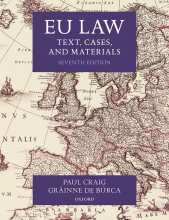Institutions, powers and decision making in the EU
11 important questions on Institutions, powers and decision making in the EU
The European Commission; executive power
- the establishment of EU budget
- Concering external relations
The European commission; judicial power
- It brings action against a Member State when they are in breach of EU law
- it also acts in certain areas as investigator and initial judge of a treaty violation whether by a MS of private firms.
The Council; committee of permanent reprentatives
Coreper is staffed by senior national officials and operates at two levels:
- Coreper II: representatives that are of ambassadorial rank. Dwls with contentious matters
- Coreper I: responsible for issues such as environment, social affairs, transport and internal market.
- Higher grades + faster learning
- Never study anything twice
- 100% sure, 100% understanding
The European Council; composition
The European Council; role in EU
- shaping EU policy
- Establishing the parameters within which the other institutions operate
High representative of the union for foreign affairs and security policy
art. 13 TEU
The High Representive (HR):
- appointed by the European Council by qualified majority
- with the agreement of the commission president
the HR:
- conducts the EU common foreign and security policy
- takes part in the work of the European Council
- chairs the foreign affairs council
- vice president of the commission
The European Parliament; composition and functioning
- EP sits in Strasbourg
- Parliaments term is five years
- MEP's sit according to political grouping
- EP elects its own president for a term of 2,5 years
- art. 232 TFEU -> EP adopts its own rules of procedure
The European Parliament; legislative power
The EP exercises jointly with the council on legislative and budgetary functions. The EP has veto power over delegated acts and is required for certain areas of legislation.
The European Parliament; dismissal and appointment power
The EP monitors the activities of the other institutions, principally the commission, by:
- asking questions
- establishing committees of inquiry (art. 226 - 227 TFEU)
- appointment of an ombudsman (art. 228 TFEU)
The European Parliament; budetary power
European Court of Justice; full court, Grand Chamber of in chambers
- Full court:
- when the case is regarded as exeptionally important
- where the subject matters warrants such as an action for dismissal of the Ombudsman or a Commissioner
- Grand Chamber:
- consists of 13 judges
- is used when a MS or an institution that is party to the proceedings so requests
- in particulary complex or important cases
- Chambers
- the great majority of the cases are heard in chambers of three of five judges
The question on the page originate from the summary of the following study material:
- A unique study and practice tool
- Never study anything twice again
- Get the grades you hope for
- 100% sure, 100% understanding
































